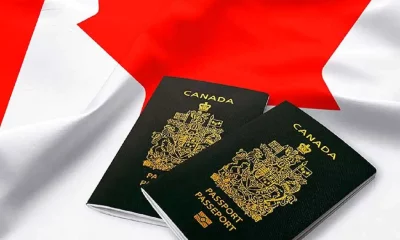Career
Work as a Receptionist in USA: A Complete Guide
Receptionists are the backbone of many businesses in the United States. They hold up many offices, hospitals, hotels and corporate firms. Receptionists mainly handle calls, greet visitors, manage schedules, and keep daily operations running smoothly. And because they serve as the first point of contact, companies rely on them to create a professional and welcoming atmosphere. For immigrants considering a receptionist job in the U.S., it’s important to understand everything about the role.
This means understanding requirements, available work visas, expected salaries, common challenges, and even different operational demands. For instance, medical and legal offices may expect expertise in specific terminology, while hotel receptionists often manage bookings and guest services. Some positions may even demand more than clerical work. Some receptionists are expected to specialize in conflict resolution, document processing, or coordinating office logistics.
Let’s take a look at the broad requirements:
Requirements for Receptionists
Most receptionist jobs require a high school diploma, but certain fields prefer additional certifications. The key skills needed to perform this role include excellent communication, organizational ability, and proficiency in office software such as Microsoft Office, Google Workspace, and CRM systems. Bilingual candidates also often have an advantage, especially in multicultural cities like New York, Los Angeles, and Miami.
Strong customer service skills are also essential, as receptionists interact with a wide range of clients and customers. Many employers also seek candidates with strong multitasking abilities, attention to detail, and problem-solving skills. In some cases, knowledge of industry-specific software (electronic medical records for healthcare receptionists or property management software for hotel front desks) may be required.
Visa Options for Receptionist Jobs
Finding visa sponsorship for a receptionist job can be challenging, as most of these reception/front desk roles do not qualify for specialized work visas. However, some exceptions and pathways exist:
- The H-1B visa is meant for highly skilled professionals with a bachelor’s degree, but receptionists can qualify if their role requires specialized expertise, such as executive assistants.
- The H-2B visa, designed for temporary non-agricultural jobs, is a less exclusive option. It provides temporary reception jobs, particularly in hospitality and seasonal businesses.
- The J-1 visa also offers training opportunities in hospitality or corporate settings for 6 to 18 months, providing valuable U.S. experience but no direct route to permanent work.
- The L-1 visa allows multinational companies to transfer employees to the U.S., making it viable for receptionists already working for large corporations abroad.
- The final option is the Green card visa sponsorship, which is rare for receptionists, as most employment-based categories prioritize high-skilled roles, but some industries may sponsor if they can prove a labor shortage.
Immigrants can also explore family-based green card options or the Diversity Visa Lottery as alternative pathways to permanent residency.
What Are Some Benefits of Being A Receptionist?
1. High Job Demand
Receptionists are in demand across various industries all across the globe. Whether it be in healthcare and law firms to hotels and corporate offices. Managing front-desk operations makes the role essential in nearly every sector. This demand creates consistent job openings, giving immigrants and job seekers multiple employment options. The steady need for front-desk personnel also means job security, as companies will always require a professional first point of contact.
2. Exposure to Different Industries
Receptionists can gain firsthand experience in a variety of industries, allowing them to build knowledge and skills that can lead to career advancement. Working in a law firm, hospital, or corporate office provides deep insight into industry-specific practices. For example, a receptionist in a medical office may become familiar with healthcare administration. Over time, receptionists can develop expertise that makes them strong candidates for promotions or even career shifts.
3. Transferable Skills for Other Careers
Receptionists pick up a lot of skills due to the nature of their work. These communication, time management, multitasking, and organization skills are highly transferable to other careers. These abilities are invaluable in roles like executive assistance, human resources, project coordination, and sales. Receptionists also develop strong problem-solving skills by handling customer inquiries, scheduling conflicts, and administrative issues.
These experiences help them adapt quickly to different work environments. For immigrants, these transferable skills increase their employability across multiple job sectors.
4. Flexible Work Schedules
Many receptionist roles offer flexible work arrangements, including part-time, full-time, and shift-based schedules. This flexibility is particularly beneficial for immigrants managing other responsibilities, such as education or family obligations. In industries like hospitality or healthcare, receptionists may choose shifts that align with their personal schedules. Some roles also allow for remote administrative tasks. Receptionist positions are a good choice for those seeking stability while adjusting to life in the U.S.
5. Opportunities for Employer-Sponsored Visas
Receptionist roles don’t always qualify for high-skilled work visas, but some companies sponsor foreign workers, especially in specialized fields. For immigrants, starting as a receptionist in a company with a history of sponsoring work visas can be a strategic career move. If you develop expertise in industry-specific software, client relations, or office management, you may even qualify for long-term employment sponsorship.
Salary Expectations for Receptionists
Receptionist salaries in the U.S. vary based on location and industry. The average annual salary ranges from $30,000 to $45,000, with higher earnings in specialized fields like medical or legal reception. In high-cost cities such as San Francisco, Washington D.C., and Boston, salaries tend to be higher, sometimes reaching $50,000 or more. However, wages in smaller towns or rural areas can be closer to the $28,000–$32,000 range.
Common Challenges In Applying as a Receptionist
Applying for any receptionist job in the U.S. comes with its challenges. This is especially true for immigrants navigating work visa requirements, industry expectations, and competition. However, understanding these challenges can help applicants prepare effectively and improve their chances.
Visa Sponsorship Difficulty
One of the biggest challenges for immigrants seeking receptionist jobs in the U.S. is finding an employer willing to sponsor a work visa. Since most receptionist roles are considered entry-level and non-specialized, they typically do not qualify for common work visas like the H-1B. Many businesses prefer to hire candidates who already have work authorization, making it harder for immigrants to secure these roles.
English Language Requirements
Receptionists need strong verbal and written communication skills since they interact with clients, answer phone calls, and handle emails. Many employers expect fluency in professional English, including proper grammar and phone etiquette. Immigrants who are not confident in their English skills may struggle to compete for jobs. However, bilingualism can be an asset in multicultural cities like New York, Miami, and Los Angeles.
Credential Recognition
While receptionist jobs do not always require formal education, some employers prefer candidates with U.S.-based certifications or work experience. Immigrants with foreign diplomas or administrative experience may find that their qualifications are not fully recognized. Taking online courses, obtaining industry certifications, or gaining local experience through internships can improve job prospects.
High Competition
Receptionist jobs attract a large number of applicants, including recent graduates, career changers, and experienced professionals. Many employers prioritize candidates with prior U.S. work experience or those who require minimal training. This makes it more difficult for immigrants to stand out, particularly in competitive job markets.
How To Apply For U.S. Receptionist Jobs
A key step is to search and apply for these jobs on reputable job platforms. Many companies specify visa sponsorship in their job postings, making it easier to filter for suitable roles. One of the best ways to improve your chances is to target industries that frequently hire receptionists with diverse backgrounds, such as healthcare, hospitality, and multinational corporations. Large employers in these fields are more likely to offer visa sponsorship, especially for temporary roles under the H-2B or J-1 visa programs.
Conclusion
Searching for roles and working as a receptionist in the U.S. can present many challenges. However, the right preparation and job search strategy can increase the chances of securing a position.















